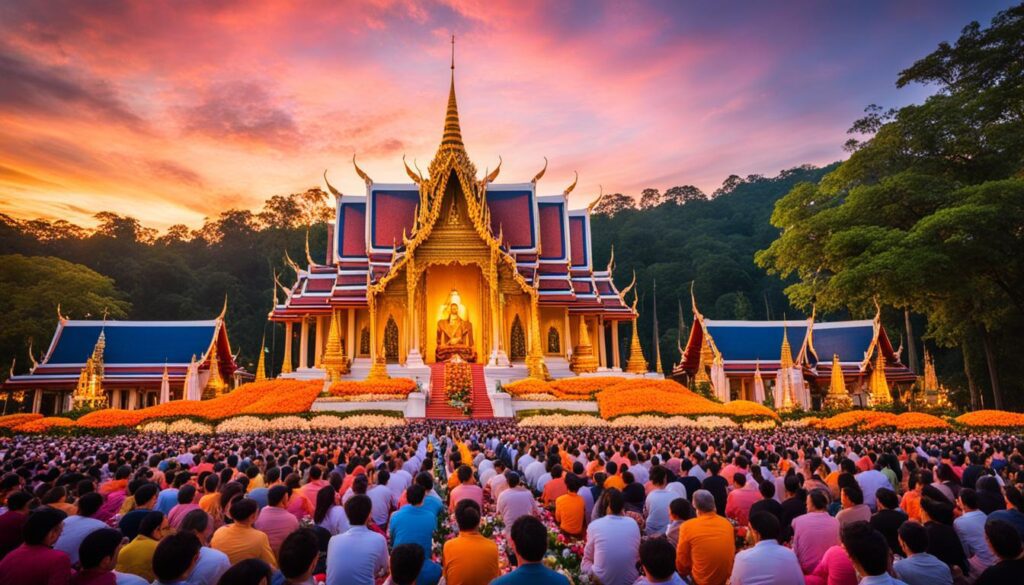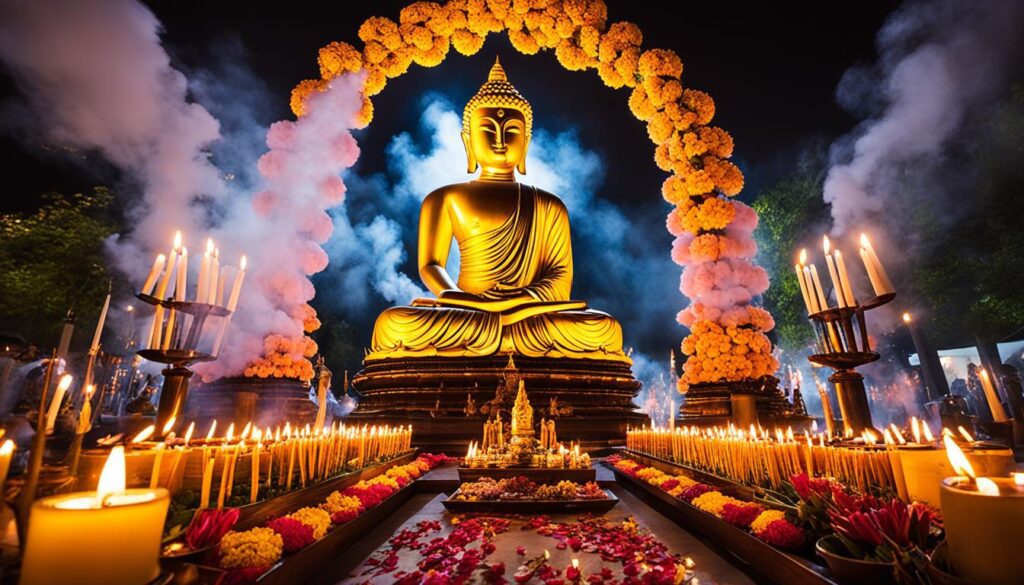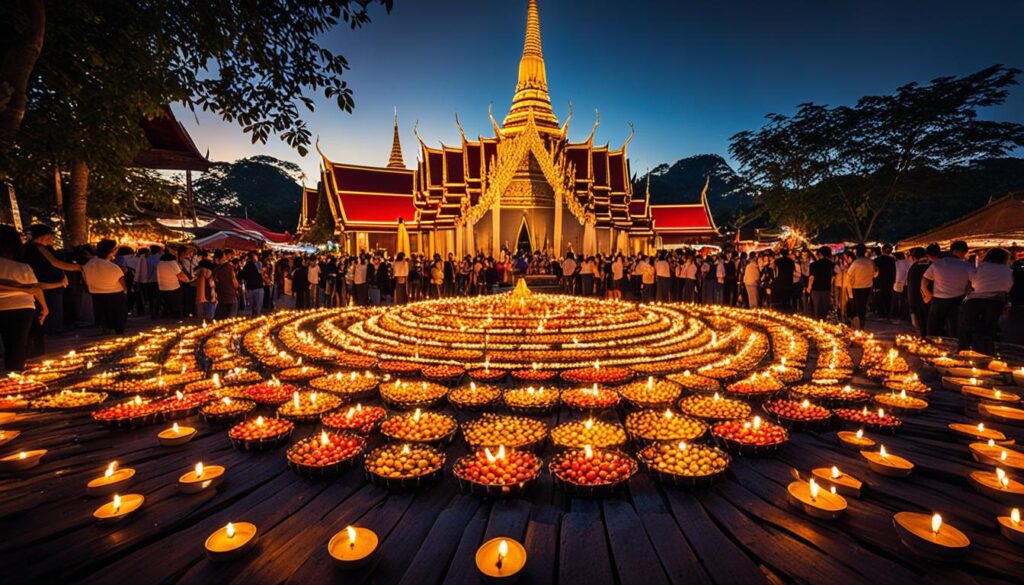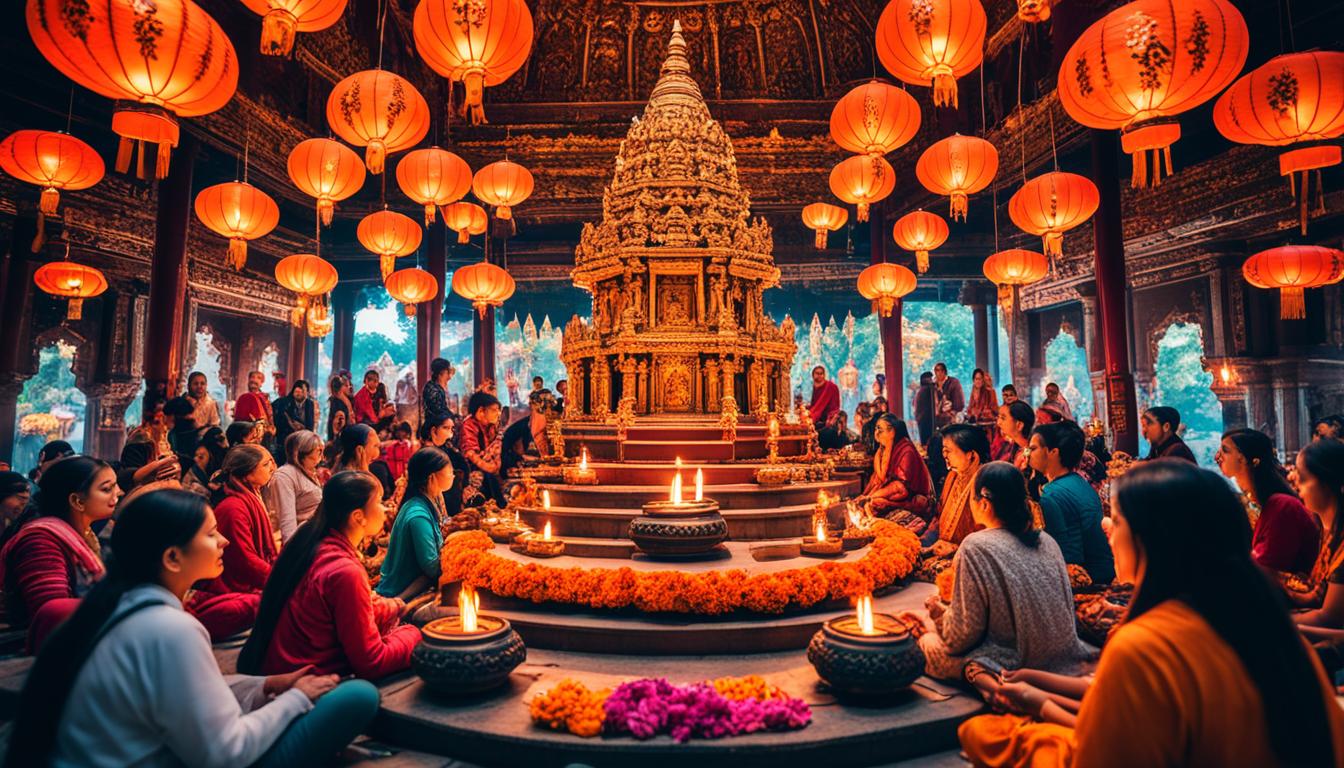Experience the spiritual essence of the Asanha Bucha Festival 2024, Thailand’s profound celebration of Buddha’s teachings and Buddhist culture.
Every year, the full moon in July beams down on a spectacle of faith as millions gather to mark the Asanha Bucha Festival, one of the most revered Buddhist festivals in the world. This isn’t just a simple holiday; it’s a testament to the enduring legacy of the Buddha’s teachings, attracting hordes of spiritual enthusiasts from across the globe to participate in a blend of vibrant religious observance and Thailand celebrations. For those eager to embark on an unparalleled spiritual journey, Asanha Bucha Festival 2024 promises to be a profound experience, deeply rooted in the heart of Theravada Buddhism.
As we draw nearer to this monumental occasion, it is essential to equip oneself with a comprehensive religious guide to fully grasp the essence and amplitude of these sacred festivities. Below is a concise encapsulation of what one must anticipate and understand as they immerse in the radiant soul of this cultural and spiritual marvel.
Key Takeaways
- Asanha Bucha Festival is a focal point for Buddhism, highlighting the Buddha’s inaugural sermon and the sublime truths shared therein.
- The festival’s magnetism pulls millions to Thailand, strengthening the shared bond of spirituality and tradition.
- Ingrained in the festival are gestures of merit-making, with visits to temples and the honouring of the Buddhist monastic community.
- Understanding the historical and spiritual context of Asanha Bucha enriches the experience for attendees and observers alike.
- Observing Asanha Bucha serves as an homage to Buddhist principles and a celebration of enlightenment’s triumph over ignorance.
The Significance of Asanha Bucha Festival
The importance of Asanha Bucha, a cornerstone among Thailand holidays, resonates well beyond its vibrant cultural festivities. It is a time when the core of the Buddha’s teachings are not just commemorated, but are actively reflected upon by devotees. Marking the establishment of the Buddhist monastic community, or sangha, Asanha Bucha embodies the Buddhist principles that shape millions of lives around the globe.
Central to this Buddhist holiday are the Four Noble Truths which encompass the existential truths of suffering (dukkha), the origin of suffering (tanhā), the cessation of suffering (nibbāna), and the Eightfold Path that leads believers out of suffering. This framework not only sheds light on the human condition but also provides a path towards transcendence, making Asanha Bucha a spiritually significant observance on the Thailand’s calendar.
Recognizing the deep-seated significance of Asanha Bucha, the day is appointed for not only ceremonial propensities but also for the reinforcement of the insightful legacy laid down by Buddha. It supports the edifice of charitable actions, magnanimous living, and the enthusiasm for a harmonious and conscious lifestyle. These values are cornerstones in the ongoing celebration and adherence to Buddhist traditions during Asanha Bucha and throughout the year.
- Remembrance of Buddha’s first sermon and the inception of the Buddhist sangha
- Engagement in acts of charity and kindness, mirroring Buddha’s compassionate teachings
- Participation in temple rituals that reinforce the sense of community and spiritual hunger
- Celebration of the enduring wisdom of Buddhist teachings through meditation and reflection
In essence, Asanha Bucha is not merely a day in the liturgical calendar but a profound culmination of faith, philosophy, and action that shapes the collective consciousness of the Buddhist community and admirers of Buddhist philosophy worldwide.
Asanha Bucha Festival 2024: Origins and Historical Context
Delving into the Asanha Bucha origins, we uncover a rich historical tapestry woven with the threads of Theravada Buddhism and the transformative moments of the Buddha’s life. This festival, resonating with spiritual significance, casts light upon pivotal historical religious events that have shaped Buddhist thought for over two millennia.
The First Sermon and the Wheel of Dharma
The genesis of Asanha Bucha is anchored in the moment the Buddha set the Wheel of Dharma in motion. His first discourse, delivered to a group of five companions, laid the foundation for Buddhist teachings and continues to be celebrated for its profound impact on spirituality and philosophy.
Theravada Buddhism and the Asanha Bucha Day
Theravada Buddhism celebrates Asanha Bucha Day to honor the first sharing of the Buddha’s enlightenment. With Pāli scriptures meticulously preserved, this branch of Buddhism emphasizes the importance of traditional texts in understanding and practicing Dharma.
The Journey of Gautama Buddha to Enlightenment
Chronicling Buddha’s enlightenment, Asanha Bucha narrates the journey of Siddhartha Gautama’s pursuit of the ultimate truth. His meditation under the Bo tree and triumph over temptations symbolizes the transformative power of perseverance and faith in the path to enlightenment.
| Event | Description | Significance in Buddhism |
|---|---|---|
| First Sermon | Introduction of the Four Noble Truths | Foundational teachings of Buddhism; the start of the Buddha’s teachings |
| Theravada Texts | Preservation of Pāli scriptures | Ensures continuity and authenticity of early Buddhist teachings |
| Enlightenment of the Buddha | Gautama’s meditative realization under the Bo tree | Embodies the ultimate goal of Nirvana and spiritual liberation |
Rituals and Traditions of Asanha Bucha
Asanha Bucha, a cornerstone Thailand religious event, is a time when traditional ceremonies and rituals permeate the air with spirituality and reverence. During this Buddhist festival, a myriad of temple activities unfold, bringing to life the deep-rooted spiritual observance enriched by the beliefs of the Thai people. Let’s delve into the essence of these practices that symbolize gratitude, respect, and the celebration of the Buddha’s teachings.
- Temple Visits: Devotees clad in modest attire flock to the temples early morning to participate in merit-making activities, underscoring their dedication to the Buddhist path.
- Alms Giving: The act of giving alms to the monks represents the laypeople’s support for the monastic community, strengthening the spiritual bond between them.
- Offerings: Candles and flowers are presented at temple altars, symbolizing the light of wisdom and the beauty of renunciation.
- Culinary Delights: Culinary offerings include traditional treats and biscuits, prepared with care and shared amongst participants, highlighting the communal spirit of the festival.
- Candle Festival: The luminous Ubon Ratchathani Candle Festival showcases intricate candle carvings, reflecting the artisans’ skilled homage to the Buddha.
- Meditation and Chanting: Temple grounds echo with the collective sound of chanting, while meditation sessions invite a deep inner reflection during the auspicious day.
The following table outlines the main activities carried out during Asanha Bucha, providing insight into the breadth of practices and their significance:
| Activity | Purpose | Expression of Devotion |
|---|---|---|
| Temple Visits | To seek teachings and participate in communal worship | Attending ceremonies and listening to monks’ sermons |
| Alms Giving | To support the monastic community | Offering food and daily necessities |
| Offerings of Candles and Flowers | To honor the Buddha’s enlightenment | Gifts symbolizing light and purity |
| Culinary Offerings | To celebrate with traditional foods | Sharing special dishes as part of the festivity |
| Candle Festival | To express artistic dedication to Buddhist teachings | Creating and displaying elaborate candle sculptures |
| Meditation and Chanting | To reinforce spiritual practice | Participating in group meditation and prayer recitals |
Asanha Bucha is not just a day on the calendar; it is a vibrant, living practice that offers a window into the soul of Thailand’s heritage, where every ritual and every chant strengthens the fabric of Theravada Buddhism and its followers.

By upholding these traditions, individuals not only pay homage to an influential Buddhist festival but also connect to a lineage of believers that have sustained and nurtured these practices for generations. As the candlelight flickers in temples across Thailand, one is reminded of the enduring legacy and the collective spiritual observance that the Asanha Bucha embodies.
Spiritual Practices during Asanha Bucha Festival
Each year, as the full moon of the eighth lunar month brightens the skies, Thailand observes the revered Asanha Bucha day—a time when spiritual practices become the heart of the nation’s cultural celebrations. The significance of this festival is not only in its remembrance of the Buddha’s first teachings but also in its embodiment of devoutness through temple offerings, meditations, sermons, and the commencement of Vassa, the Buddhist lent.

Bringing Offerings to Temples
During Asanha Bucha, the air in Thailand is thick with devotion as followers congregate to pay homage through temple offerings. Faithful Buddhists can be seen presenting monks with an array of traditional gifts—flowers, incense, and candles—all of which are meant to honor the sangha and support temple upkeep. This act is a fundamental aspect of the festival and resonates deeply with the practice of giving, which is central to Buddhist philosophy.
Listening to Sermons on the Four Noble Truths
Listed below are the main themes that are encapsulated during the sermons:
- The nature of suffering (dukkha)
- The origin of suffering (tanhā)
- The cessation of suffering (nibbāna)
- The path leading to the cessation of suffering (the Noble Eightfold Path)
These teachings, resonating through temples and monasteries, provide solemn moments for reflection, seeking to enrich the spiritual understanding and mindfulness of each participant.
Participating in Vassa: The Buddhist Lent
As the ceremonious activities of Asanha Bucha day wind down, thoughts and actions turn toward the Vassa retreat. This tradition, often likened to a period of monastic Lent, sees monks commit to a season of intensified spiritual practices, study, and meditation. Lay followers often partake in this period of focus and reflection, albeit less intensely, marking their dedication to spiritual deepening.
Brief information on Thailand’s Vassa retreat is outlined below:
| Period | Activities | Spiritual Focus |
|---|---|---|
| Rainy season (3 months) | Meditation, Pali studies, additional Vinaya studies | Cultivation of discipline, deeper insight into Dharma |
| End of Vassa | Kathina ceremony with robe offerings to monks | Community solidarity, generosity towards the Sangha |
The Vassa retreat not only aligns monks and devout Buddhist practitioners with the fundamental principles of their faith but also echoes Thailand’s rich tapestry of cultural and spiritual heritage. It is during this time that one can truly immerse oneself in the edifying principles of Buddhism, fostering a period of harmony, community, and spiritual renewal.
Cultural Celebrations Across Thailand
As the Asanha Bucha Festival approaches, communities throughout Thailand erupt into a series of vibrant cultural festivities. These events are a true testament to the powerful blend of religious devotion and the collective energy of the people. From the illuminated skies of Ubon Ratchathani to the elaborate Candle Festival, each activity carries the essence of Buddhist culture and adds to the fabric of Thailand’s holidays.

Lantern Processions in Ubon Ratchathani
In Ubon Ratchathani, a city becomes aglow during Asanha Bucha, as numerous lantern processions create a mesmerizing spectacle for both locals and visitors. These processions, where thousands of lanterns are released into the sky, symbolize the release of misfortunes and the illumination of one’s future with hope and wisdom.
The Candle Festival and its Symbolism
The Candle Festival is a highlight of the season, where the underlying symbolism takes center stage. Here, the act of lighting candles is reminiscent of the Buddha’s wisdom, casting out darkness and guiding the faithful on the path of enlightenment. Craftsmen from across the country contribute exquisitely designed candles, turning this gathering into a profound artistic and spiritual display.
Community Endeavors and Religious Events
Thailand holidays are imbued with community spirit, and Asanha Bucha provides an opportunity for collective celebration and spiritual reflection. Religious events held during this period promote unity and demonstrate the community’s role in preserving and showcasing Buddhist traditions. Bangkok events, as well as those in smaller villages, come alive as locals engage in temple activities, practice dana (giving), and reinforce social bonds through shared beliefs.
| Event | Location | Activities | Cultural Significance |
|---|---|---|---|
| Lantern Processions | Ubon Ratchathani | Lantern release, parades | Symbolizing hope & the wisdom of Buddha |
| Candle Festival | Various locations | Candlelit processions, artistic displays | Representing Buddha’s light in darkness |
| Community Events | Temples across Thailand | Offerings, meditation, teachings | Strengthening bonds within Buddhist community |
Conclusion
The Asanha Bucha Festival, with its grandeur and spiritual gravity, leaves an indelible impression on contemporary Buddhism. This enduring event not only stands as a cultural festival brimming with life and color but also as an important mechanism for preserving Buddhist traditions. As participants from various parts of the globe convene to take part in this cherished celebration, they bear witness to the seamless confluence of historical religious observance and modern practice.
Asanha Bucha’s Impact on Modern Buddhism
In modern times, where the quest for spiritual essence oftentimes encounters the clamor of hectic lifestyles, Asanha Bucha offers a serene harbor that beckons the faithful back to the principles that underpin their beliefs. The festival continues to imbue present-day Buddhism with a vitality that reinforces the ongoing relevance of the Dharma. It is a time where the Buddhist community can affirm their dedication to the teachings that have guided them through centuries.
Preserving Buddhist Traditions Through Celebrations
Through its rich tapestry of traditions and celebrations, Asanha Bucha plays a pivotal role in safeguarding the Buddhist way of life. By engaging heart and soul in the festivities, practitioners contribute to a living history that does not just pay homage to a storied past but also inspires a brighter future. The principles of mindfulness, compassion, and wisdom, celebrated during Asanha Bucha, pave the way for a global community intricately woven with the threads of personal growth and collective harmony.
FAQ
What is the Asanha Bucha Festival?
The Asanha Bucha Festival is a significant Buddhist festival that commemorates the Buddha’s first sermon after he attained enlightenment. It takes place on the full moon of the eighth lunar month, typically in July, and is observed with various religious and cultural activities throughout Thailand and other Theravada Buddhist countries.
Why is the Asanha Bucha Festival celebrated?
Asanha Bucha is celebrated to honor the Buddha’s delivery of his first discourse, where he laid out the Four Noble Truths and the Wheel of Dharma to his first five disciples. It is a time for Buddhists to reflect on the essence of the Buddha’s teachings and to engage in spiritual observance and communal festivities.
What are the main activities during the Asanha Bucha Festival?
Main activities include visiting temples to make offerings, participating in lantern processions, listening to sermons on the Buddha’s teachings, and joining in the Candle Festival. These activities are expressions of reverence and are meant to fortify the bonds within the Buddhist community.
Can tourists partake in the Asanha Bucha Festival celebrations?
Yes, tourists are welcome to observe the Asanha Bucha Festival. They can learn about Buddhist traditions, watch the cultural festivities, and are encouraged to approach the celebrations with respect and an open mind. Tourists often find the experience to be very enlightening and enriching.
What is the significance of the Candle Festival during Asanha Bucha?
The Candle Festival, particularly celebrated in Ubon Ratchathani, is symbolic of the Buddha’s wisdom shining light over the world. The elaborately carved candles and the beauty of the lantern processions create a visual representation of the enlightenment that the Buddha spread among his followers.
How does Asanha Bucha lead into the Buddhist Lent Vassa?
Asanha Bucha directly precedes Vassa, which is the Buddhist Lent period. This is a time when monks traditionally enter a retreat for three months during the rainy season, beginning the day after the Asanha Bucha Festival, to focus on meditation and study, while lay people often take up renewed spiritual commitments.
What is the historical context of the Asanha Bucha Festival?
The historical context of Asanha Bucha Festival lies in the moment after the Buddha attained enlightenment and decided to share his profound insights with others. This gave rise to the first sermon delivered in the Deer Park in Sarnath, and it marks the establishment of the Buddhist community and the inception of Buddha’s teachings.
Are there any specific foods associated with the Asanha Bucha Festival?
While there are no specific foods prescribed for the festival, it is common for people in Thailand to prepare and offer traditional treats and biscuits at temples as part of their offerings. Additionally, many choose to observe a vegetarian diet on this day as a form of spiritual cleansing and merit-making.
Is the Asanha Bucha Festival a public holiday in Thailand?
Yes, Asanha Bucha is a public holiday in Thailand. Government offices, banks, and many businesses are closed on this day, allowing the populace to fully participate in the festival’s events and activities.
How can one practice mindfulness during Asanha Bucha?
Mindfulness can be practiced during Asanha Bucha by engaging in meditation, listening attentively to sermons, and reflecting on the Buddha’s teachings. It’s a time to focus on spiritual growth, ethical conduct, and cultivating compassion and wisdom in everyday life.






Leave a reply